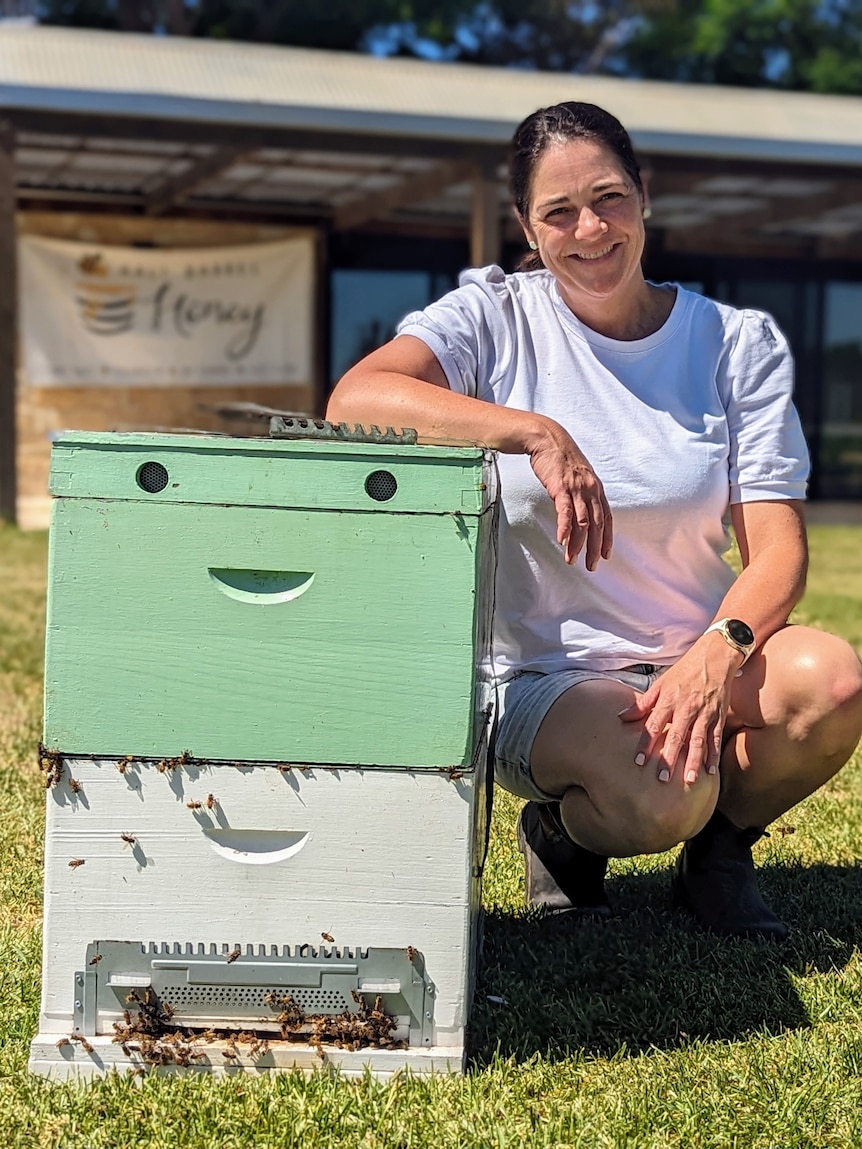Beekeepers in South Australia’s Riverland are concerned about chemical use after a spate of unexplained hive deaths.
Key points:
- SA beekeepers have reported the sudden deaths of tens of thousands of their bees in recent months
- The government’s fruit fly eradication program has been accused of contributing to the deaths
- PIRSA says it doesn’t use the chemical Naturalure on properties known to have beehives
Paringa beekeeper Rob Johnston said he found bees from seven of his hives dead in November last year, their bodies spread like a carpet.
“There were 40,000 to 50,000 bees in those hives and it was just like a carpet between 25 to 40 millimetres deep,” he said.
“The bees that were still dying were crawling over them, trying to get away from the hive.”
The state Department of Primary Industries (PIRSA) tested a sample of his dead bees and found the presence of a broad-spectrum insecticide fipronil, which is not used in the fruit fly eradication program.
The region, about two hours drive from the state’s capital of Adelaide, has been battling Queensland fruit fly outbreaks since December 2020.
But Mr Johnstone is unconvinced that this was the only chemical at play.
“I contacted the owner of the place where my hives are and they told me … PIRSA staff [had been] spraying along their boundary line on another property,” Mr Johnstone said.
He is concerned that the chemicals being used by PIRSA to eradicate Queensland fruit fly in the region could be contributing to the deaths of bees.
Chemical concern
As a former dryland farmer turned beekeeper, Ian Cass knows his chemicals.
The Loxton resident lost millions of bees in July last year, worth about $20,000, and is convinced it was due to sprays used in the fruit fly program.
“I don’t think it was too mysterious because PIRSA fruit fly people were spraying right near my hives,” he said.
Mr Cass said the owner of the property, where he had his bees, had told PIRSA to stop spraying.
“There was a strong wind blowing towards my hives and he said ‘this is way too dangerous’,” he said.
“This stuff drifts.”
Days later, Mr Cass visited his hives and found piles and piles of dead bees.
“I discovered double handfuls of bees in front of all the hives. Twelve hives were dead and 80 were damaged,” he said.
Mr Cass said the active ingredient in Naturalure, spinosad, was not only toxic to bees, he had also expressed concern that he felt PIRSA staff were not following instructions on applying the chemical safely.
Confidence crushed
Renmark West beekeeper Kerry Chambers said she has discovered hives full of dead bees on two occasions.
“It’s pretty heartbreaking because I’ve only got a small amount of hives, about 25, so anytime I lose a hive it’s pretty devastating,” she said.
Ms Chambers’ property is surrounded by vineyards and is in a fruit fly outbreak area.
“I understand that farmers need to spray pesticides to protect their crops, and some are harmful to bees, but we’ve also been hit pretty hard by [fruit fly] sprays,” she said.
“All we know is that there’s something happening that hasn’t been happening in the past that’s really impacting our bee populations.”
Like Mr Johnstone and Mr Cass, for Ms Chambers to lose a hive has a financial and emotional toll, with an immediate loss of income as well as the months needed to re-establish hives.
Organics under scrutiny
Melbourne University postdoctoral fellow Felipe Martelli said organic insecticides, like spinosad, could cause serious damage to beneficial insects.
“Even at very low doses it can have a chronic effect,” he said.
“First they get really lethargic, it compromises their ability to mate, their ability to eat, and they can’t go through metamorphosis,” he said.
Dr Martelli said while his research had focused on the impact of chemicals on vinegar flies, it was hard to assume the affect on honeybees.
“They lack some of the defence strategies that other insects have so sometimes they’re much more prone to insecticide effects,” he said.
Dr Martelli said misconceptions about the safety of organic insecticides were an increasing worry.
“Even though it’s a natural product it’s still super nasty,” he said.
“The effects it has on insect biology seem to be much worse and are more efficient than synthetic insecticides.”
Investigations ongoing
A PIRSA spokesperson said in a statement it had conducted extensive investigations into bee deaths in the Riverland.
It said staff used Naturalure to attract fruit flies but it was not applied to bees, hives, or flowering plants where bees are foraging.
“The department doesn’t use Naturalure on properties the agency is aware contains or is hosting managed beehives,” the statement said.
Stories from farms and country towns across Australia, delivered each Friday.
Posted , updated




